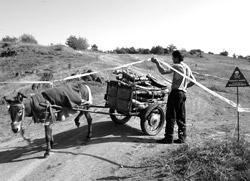I had an opportunity to visit the distant regions of Armenia and Karabakh during the past two months. I got a bad impression in both Armenia and Karabakh-villages with lack of necessary substructures, unemployment, some subsidies and pensions paid from the state budget, which don’t really solve any issues.
The donkey and the owner of the donkey
What amazed me was how independent the people living in those residential areas were. They live freely and independently in those miserable conditions-they’re not expecting anything from the local and central authorities. They don’t complain or demand better living conditions because they haven’t seen that and don’t know what that means. Yerevan and Stepanakert are remote, foreign lands for them, capitalist countries, which they weren’t allowed to visit during the Soviet era, meanwhile now people simply don’t have the opportunity.
These people don’t know what capitalism is- not because they are far away, but because there is no circulation of money for them to sell products and get the money back. If they are lucky and don’t see a dry season, they’ll collect enough wheat and, if they’re even luckier, someone may come to the village and purchase the wheat in exchange for clothes or shoes; so what we have is trade. If he doesn’t come…well, you can’t change your wheat with the wheat of your neighbor can you, or pile it in your friend’s truck to go and trade it at the market?
But what also happens is that the dry season comes along and you’re left with nothing. Based on the rules of capitalism, the villager is required to produce his product and sell it at the market. If he doesn’t sell it, this is the only time when he is not punished for not fulfilling the requirement. For example, when a villager’s son turns eighteen, he is required to go serve in the army. It doesn’t even cross the villager’s son’s mind to escape from the army because this is his chance to eat and dress well for two years.
The villager is also required to pay property taxes, but in this case, even if they don’t punish him, he does feel pressure, he is reminded, etc. They levy 4,000 AMD a year for keeping a farm. You can’t give wheat or other produce, or ask the relative living abroad to add the 4,000 when sending the money so you can pay for your donkey. While the villager thinks about how to get rid of the tax for keeping a donkey, he continues to go along the paths belonging to the country, have the donkey eat the grass considered as part of the state and pollute the nature of the country with the dirt of the animals.
Local and state elections are coming up. Some people come to the village with their Jeeps and Mercedes Benzes and promise to pay the villager’s tax for keeping a donkey if they elect the given candidate. Of course, the candidate and his friends make other promises as well, taking into consideration their long terms; so, they avoid understanding and solving issues through the “either the donkey or owner of the donkey” logic.
House of ceremonies
The distant villages have many issues and the most important one concerns drinking water and water for irrigation. Villagers walk hundreds of meters carrying buckets just to get water for the home. The villagers with donkeys or horses put heavier loads on them. Drinking water somehow makes it home. No donkey or horse will be able to resist the lack of irrigation.
The roads tying the residential areas and the village streets remind you of a period when man still hadn’t created any means of transportation. Although walking is healthy, however it endangers your life. It’s inevitable to come across hungry beasts. It seemed as though the nurse from Vardenis was telling a story as she described her encounter with a pack of wolves.
In the village, having a phone is not a means of communications, rather a luxury. Many villages don’t even have a telephone network. In other words, the slogan “Let’s Talk” for “ArmenTel” is only literally speaking. If the nurse living in the neighboring village (the same nurse who got attacked by the wolves) has to make a phone call, she has to go to the neighboring village just to talk.
When asked “What does your village need the most?” most of the village heads whom I talked to replied that they need a house of ceremonies. That’s a place where the people organize weddings, funerals, farewell parties for men serving in the army, graduation parties (if there are more than two graduates).
You see the same everywhere-if there is no bread to eat, then eat whatever there is. If you can’t find that either, then find ways of telling people that Armenians are victorious. If we are victorious, then we haven’t lost anything and if we haven’t lost anything, then we shouldn’t try to throw the blame on people who are completely innocent.

